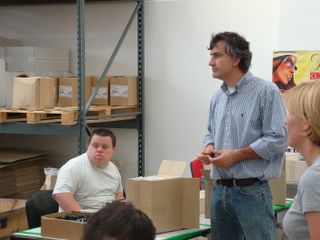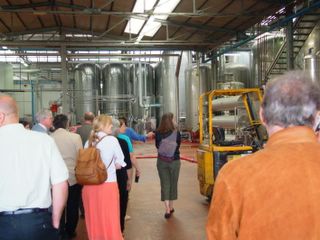New Impressions of Emilia Romagna--a Global Leader in Innovative Approaches to Development and Economic Democracy
In the 1940s, the Emilia Romagna region in northern Italy—Bologna is its center—was one of the poorest regions in Europe. Today, according to Bob Williams, of the Van City Capital Corporation in Vancouver:
“There are 90,000 manufacturing enterprises in the region, surely one of the highest densities per capita in the world! Small, medium, enterprises (SME’s) predominate. One person in twelve is self-employed or owns a small business. In recent years the region has produced the highest GDP per capita in the country, and it now ranks with the ten best in Europe…2/3 of the citizens of Bologna belong to a co-op…45% of the GDP is produced by co-ops…(and) 85% of the social services in Bologna are delivered by co-ops…”
Today it’s a fascinating web of cooperatives, small manufacturing companies, innovative social service programs, and a complex and dynamic partnership between business, labor, and government. It’s a region that was governed by the Italian Communist Party for over thirty years, and still has strong labor, social and business organizations and leaders that identify with the left, as well as a strong Catholic tradition among those sectors, and a smaller presence of similar companies, organizations, and networks that identify with the right.
I with 16 other American and Canadian cooperative practitioners just spent 5 intense days in Emilia Romagna studying this phenomena with the support of the Cooperative Charitable Trust Forum of Cambridge, Massachusetts. I was looking at this region to understand it relevance and importance for those who are looking for a model for development that is practical, has scale, and consistent with social justice values. This was my second visit and study tour. After the first, I had more questions than I started with, and was skeptical. This time, I got it. This region needs to go to the top of the list for those in the developed and developing world creating the competitive alternative development model.
v Some of Emilia Romagna’s manufacturing companies that are world class high performance companies are cooperatives.
Other private companies and cooperatives work together in flexible networks that combine a number of smaller firms into joint projects.
And government has played a powerfully positive role in creating sector-based service centers that assist smaller companies in being competitive in the global economy;
v Coop Italia is the top retailer surpassing giants like the French equivalent of Wal-Mart—Carrefour—in sales.
It has 6 million owner/members, 55,000 employees, 1,200 stores, and €11 Billion in sales;
v Cooperatives are legally required to put profits into an “indivisible fund” that will sustain the company for generations and can’t be taken by the worker owners;
v The cooperatives have their own huge insurance company—Unipol, large investment funds such as Coop Fund to provide loan and equity to start-up companies, and very sophisticated support organizations such as Lega Coop that provide a full-range of technical, educational, and financial services to insure the success of cooperatives;
v “Social Cooperatives” provide various services to the mentally and physically disabled—“privatizing” what historically were state services but to cooperatives that are frequently preferred by professionals because they permit creativity and the delivery of high quality services and work experience for the disabled; and
v Italian cooperatives are expanding internationally, and the cooperative movement is assisting the growth of cooperatives in both the developing as well as the developed world. Recently the Coop Fund and a large cooperative of restaurants committed $500,000 in debt and equity, as well as technical assistance to a group of workers in New York City affiliated with the labor-based Restaurant Occupation Center who are starting a restaurant cooperative in Manhattan.
Those committed to economic democracy and sustainable development need to learn more about this experience. See Coop Italia power point, Bob William’s full article, and a great description by David Thompson on the region at www.clcr.org



